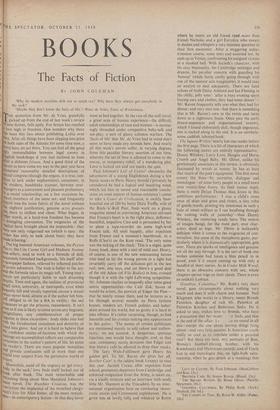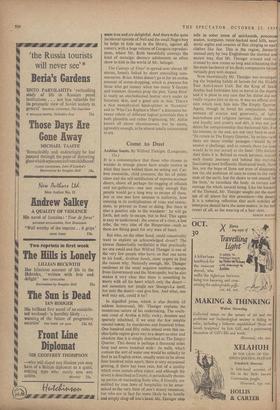BOOKS
The Facts of Fiction
By JOHN COLEMAN
'Why do modern novelists dish out so much sex? Why have they always got everybody in the sack?'
'Maybe they don't know the facts of life.'—Peter de Vries, Tents of Wickedness.
IHE quotation from Mr. de Vries, gratefully picked up from the end of last week's review nf new fiction, falls aptly. For fiction has reached a new high in freedom. One wonders why there has been this fuss about publishing Lolita over here. After all, things have been slipping into print nn both sides of the Atlantic for some time now, a Word here, an act there. You can find all the good English monosyllables between legal covers in tnglish bookshops if you feel inclined to hunt after a dubious frisson. And a good third of the novels to have come my way in the past year have contained reasonably detailed descriptions of sexual congress (though the organs, it is true, con- tinue to lurk under euphemisms), sometimes, in the modern, handshake manner, between near- strangers as a convenient and pleasant preliminary to a social relationship; on a few occasions be- tween members of the same sex; and frequently forced into the loose fabric of the novel without the slightest justification, genuine acres gratuits put there to titillate and cheer. What began, in °lher words, as a hard-won freedom has become 4 strangling convention. The exigencies of the market have brought about the impossible : they have not only vulgarised sex (which is easy : the \vriter has only to look about him); they have 'glade it boring. The big boosted American volumes, the Peyton Places, the City Career Girl and Madison Avenue hest-sellers, tend to work to a formula of dull, accurately furnished backgrounds, 'life itself' after 4 newspaper fashion, relieved by inflamed patches nf erotic adventure. The wish is father to the act; and the formula takes its magic toll. Young men's novels are particularly liable to such dreaming (leceits. Time and again, the realities of provincial fliall town, university, or metropolis, even when honestly felt and vividly reported, encase a sexual never-never-land, almost as if the author felt him- self obliged to sit for a BA in virility : the oaf continues to get the princess, reasonlessly. It isn't even as if one is likely to come across any linguistic Sprightliness, any communication of proper appetite in these excursions : body slides into bed \v, ith the foredoomed casualness and dexterity of nand into glove. And yet it is hard to believe that the confident matter-of-factness with which the INtings are accomplished reflects any comparable certainties in the author's pattern of life, let alone the reader's. There are more popular moralities and private confusions still at work than one 'vould ever suspect from the permissive world of fiction.
, Meanwhile, amid all the urgency to 'get every- body in the sack,' love finds itself locked out of 'ook after book. The most remarkable and II'freshing thing about Miss Hansford Johnson's aleit novel, The Humbler Creation, was the conviction she implanted of the wretched clergy- inan's love for Alice Imber, all the more remark- able--in contemporary fiction—in that they never
went to bed together. In the run-of-the-mill novel, a great area of human experience—the difficult, adult relationships of men and women—is increas- ingly shrouded under competitive baby-talk and sex-play, a sort of glassy echoless warfare. The `facts of life' that Mr. de Vries had in mind don't seem to have made any inroads here. And nearly all this week's novels suffer, in varying degrees, from this peculiar literary sanction of our time, whereby the act of love is allowed to come to the rescue, or temporary relief, of a wandering plot. Love is locked out and sex marks the spot.
Paul Johnson's Left of Centre' chronicles the adventures of a young Englishman during a few hectic weeks in Paris. Henry Arnold ('privately he considered he had a logical and inquiring mind, which led him to sound and reasonable conclu- sions on most aspects of human existence') comes to take a Cours de Civilisation, is swiftly bam- boozled out of £80 by busty Dora Trak, wife of the Rock-'n'-Roll Peer, finds work on a glossy magazine aimed at convincing American aid-men that France's heart is in the right place, deflowers beautiful, impulsive Cleo and is persuaded by her to plant a tape-recorder on some high-level Fascist talk. All ends happily, after expulsion from France and a moment's heartbreak, in a Rolls (Cleo's) on the Kent road. 'The only noise was the ticking of the clock.' This is a slight, quite funny book, done with a sort of mild-zest. Henry, of course, is one of the new unassuming heroes who tend to hit the wrong person in a fight but invariably carry off the delicious girl in the last reel; new, one says, and yet there's a good deal of the old Adam (of Vile Bodies) in him, crossed though it is with the right Left-wing sympathies. Mr. Johnson reaches so languidly after some good satiric opportunities—the Café Zok, haven of would-be artists, the portrait of Edgar the Poet— that he nearly misses them, and he lectures us a bit through several mouths on Paris fashion houses, modern art, French politics, and ladies' skins around the world, but so gently it is hard to take offence. It's rather surprising, though, to find Soustelle and his cronies making tiny appearances in this galore: 'The names of certain politicians are mentioned merely to add colour and authen- ticity,' we are assured. A dangerous, spurious injection, one would have thought; and, in that case, consistency surely demands that Edgar and that literary café be allowed to drop their masks.
The fairy Wish-Fulfilment gave Henry his golden girl. To Mr. Raven she gives her all. Brother Cain= is the oddest book I expect to read this year. Jacinth Crewe, after expulsion from school, premature departure from Cambridge, and enforced resignation from the Army, is taken on, via a kindly mistress and an interview with seedy little Mr. Shannon at the Trocadero, by an inter- national organisation bent on combating 'demo- cratic excess and Communist exploitation.' He is given lots of lovely lolly and whisked to Rome where he meets an old friend (and, more than friend) Nicholas and a girl Eurydice who swears in dashes and whispers a very intimate question at their first encounter. After a staggering indoc- trination course, some tests and assorted sex, he ends up in Venice, confronting his assigned victims at a masked ball. With Jacinth's charcter, with his easy bisexuality, his Cambridge nostalgia and dreams, his peculiar concern with guarding his 'honour' (while fairly coolly going through with one of the nastiest acts imaginable), it would take an analyst to deal adequately. There are faint echoes.of both Daisy Ashford and Ian Fleming in the chilly, jolly tone: 'after a busy evening spent buying cars and clothes, they had some dinner' -- Mr. Raven frequently tells you what they had for dinner, and very nice too—but there is something that is Mr. Raven's own in the twists and turns down to a nightmare finale. Once past the early dream-sequences and organisational oratOry. which 1 found elaborately dull, though ingenious, one is sucked along to the end. It is an unwhole- some, caddish, talented book.
?'lie Square Within" nearly lost one reader before the first page. There is a list of characters of which the following names are entirely representative : Danny Whiskey, Larry Love, Hengist and Horsa Crumb and Angel Baby. Mr. Oliver, unlike his gentlemanly associates in this review, is obviously fascinated by words as noises; he has at least that much of the poet's equipment. This first novel covers the lives—by narrative, dialogue and monologue—of some forty people in a small town over twenty-four hours. As their names imply there is more Dylan. Thomas than Joyce in this ambitious performance : '1 was a child's 'cross once of skies and grass and rivers, a tiny echo of gentle words, pruning my innocence in such a halo of sweet william as I ran headlong through the rushing walls of yesterday'—thus Danny Whiskey, the roistering randy hero. The swarm of images hangs, for the most part, over char- acters dead as logs; Mr. Oliver is noticeably deficient when it comes to the exigencies of con- versation; but some of the metaphoric gusto, par- ticularly where it is dramatically appropriate, gets over. There are sparks of intelligence and genuine wit all the way through. It is the sort of book one wishes someone had taken a blue pencil to in proof, even if it meant coming up with only a handful of short stories. As in Under Milk Wood, there is an obsessive concern with sex; whole chapters sprout wigs on their chests. There is even an unlikely Lesbian.
Goodbye, Columbus,' Mr. Roth's very short novel, goes circumspectly about nothing very much and does it with charm and humour. Neil Klugman, who works in a library, meets Brenda Patimkin, daughter of rich Mr. Patimkin of Patimkin Kitchen and Bathroom. Sinks. He is asked to stay, makes love to Brenda, who buys
a precaution that her mothr :r finds, and that
is the end of the affair. I c no moral in all
this—except the one about leaving things lying about—and very little passion. Is American youth really so cool as to copulate under a parental roof? But there are neat, wry portraits of Ron, Brenda's football-playing brother, with his Kostelanetz and Mantovani records, and of Uncle Leo (a sad monologue this, on light-bulb sales- manship, when he gets drunk at a wedding) that
' LEFT OF CENTRE. By Paul-Johnson. (MacGibbon and Kee, 15s.)
BROTHER CAIN. By Simon Raven. (Blond. 15s.)
' THE SQUARE WITHIN. By Bruce Oliver. (Neville Spearman, 16s.) GOODBYE, COLUMBUS. By Philip Roth. (Andr-1., Deutsch, 10s. 6d.)
' THE CANOPY or Thor. By Brian W. Aldiss. (Faber, I Ss.)
seem true and are delightful. And there is the quite incidental episode of Neil and the small Negro boy he helps to hide out in the library, against all corners, with a huge volume of Gauguin reproduc- tions, where Mr. Roth beautifully conveys the kind of nostalgic decency adolescents so often show to kids in the world of Mr. Salinger.
The Canopy of Time' is spread over eleven SF stories, loosely linked by short unavailing com- mentaries. Brian Aldiss doesn't go in for an undue amount of nome-dropping, which is pleasant for those who get uneasy when too many Y-factors and transtort diuretics prop the plot. 'Gene Hive' is really an old-fashioned horror story under its futuristic skin, and a good one at that. There's a nice metaphysical head-splitter in 'Incentive' and in 'Who Can Replace a Man?' a discussion be- tween robots of different logical potentials that is both plausible and rather frightening. Mr. Aldiss knows all about chromosomes, but he seems, agreeably enough, to be almost totally uninterested in sex.







































 Previous page
Previous page